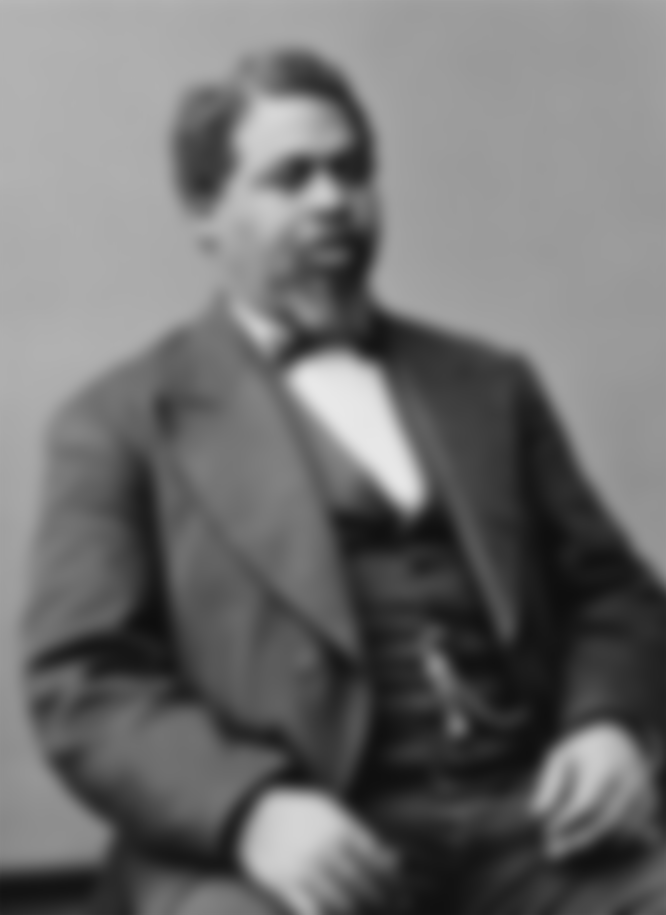Born a slave, he spent most of his youth illiterate, but thanks to his intelligence, perseverance, and courage bordering on insanity, he managed to rise to the very top of American political life.

Robert Smalls (1839-1915) grew up in Beaufort, a lovely town in the US state of South Carolina. His mother, Lydia, was a slave to landowner Henry McKee, and it was this man who allegedly - by grace or force - made her a child. Either way, the fact is that the mother and son lived much better than the other slaves on the estate: she did the housework, and McKee spared the boy, believing she was carrying his blood, a chore. Furthermore, he was allowed to enter his owner’s house and play with local white children. Lydia was happy about it at first, but as the toddler grew, she feared she wouldn’t realize how horrible slavery actually was.

In order to inform him about the suffering of people with the "wrong" skin color, she took him to a field on his tenth birthday, where dozens of slaves harvested cotton, rice and tobacco for the summer "whistle". His mother ordered him, within the limits of his childhood, to take the hoe in his hands himself and to sleep on the earthen floor later, together with the other workers. The lesson was effective - even too much.

Shocked by the sight of the brutal flogging of his siblings, the boy developed a deep hatred for the white oppressors. As a teenager, he began protesting loudly against the institution of slavery, which provided him with several stays behind bars. Fearing that her pedagogical action was a mistake, Lydia asked McKee to hire her (and her) son at a port in Charleston, one of the largest American cities of the time. There, in the center of the slave trade, a young man lit city lanterns and meo the streets. For every $ 15 he earned, he was allowed to keep one - the rest he had to send to his master.

Discovering a passion for the sea and sailing, he progressed from port worker to helmsman over the next decade.
In April of that year, an attack by Southern artillery on Fort Fort Sumter in Charleston, the American Civil War began. As history unfolded before his eyes, Smalls became increasingly determined to simply grab freedom! When he got the job of assistant helmsman on the CSS Planter, a Confederate transport ship under the command of Brigadier General Roswell S. Ripley, a bold plan began to form in his head.
The handsome young man, who was valued by everyone in Charleston as an experienced "sea wolf", met the slave Hannah Jones in the city. They married and had a daughter, then a son, but the toddler died before his second birthday. Smalls, a devoted husband and father, dreamed of buying the freedom of his small family, but the price was too high. Aware of the fact that it would take him decades to raise the required sum of $ 800 (the equivalent of today’s $ 25,000), and that if he didn’t eat, he began to despair. And then, in May 1861, he came up with a solution - admittedly extreme, but so was his problem.

On May 13, 1861, in agreement with the rest of the ship's black crew, Smalls waited for the moment when Ripley and his men would come ashore. He smuggled his wife and daughter into one of the cabins, after which the ship (loaded with a hundred kilograms of ammunition, five large cannons, seventy cubic meters of firewood and hundreds of crates full of food and medicine) simply - stole!
He passed the checkpoints thanks to cunning: he wore Ripley's clothes, imitated his posture, which he studied for hours, and used as a disguise a wide-brimmed straw hat, which the general always wore and which hid half his face. Incredibly, the trick worked - in the territory of the Union, where he drove the ship, Smalls was greeted as a hero.

While in Charleston, to which he will never return, his head was blackmailed for a staggering four thousand dollars (and the unfortunate Ripley was resting behind bars for his “criminal negligence”), Smalls became commander of the CSS Planter, now the Union vessel. For his feat, Congress awarded him the rank of naval officer, $ 1,500, and an audience with Abraham Lincoln. It was Smalls who persuaded the then American president to allow African Americans to join the military. Having received the green light, he personally recruited over five thousand black brothers, and in the numerous battles at sea, which he led, he showed courage and strategic genius.

After the war, he returned to South Carolina and with the money allocated to him by Congress bought the house of his former master. Altruistic as he was, the wife of the late boss, the old, disabled and senile woman who kept coming to his door, he allowed him to stay in that magnificent building for the rest of his life!

After opening one of the first schools for black children in the region, he fought for a seat in the South Carolina House of Representatives and then in the state Senate. In 1874, he became a representative in the American Congress, winning eighty percent of the vote. For five consecutive terms, he fought tirelessly against racial segregation.







